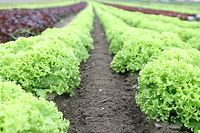A new joint initiative between the U.S. Food and Drug Administration (FDA), the Arizona Department of Agriculture, the University of Arizona Cooperative Extension (UACE), the Wellton-Mohawk Irrigation and Drainage District (WMIDD), and various members of the Yuma, AZ, leafy greens industry will review the ecology of human pathogens in the environment in the Yuma agricultural region.
The joint venture will be a multi-year study that will focus on how human pathogens survive, move, and possibly contaminate produce prior to harvest.
The impetus for this endeavor is the Escherichia coli O157:H7 outbreak linked to romaine lettuce in 2018 that sickened 210 individuals in 36 states and claimed five lives.
Immediately after, the same aforementioned organization, plus the U.S. Centers for Disease Control and Prevention, partnered to complete an environmental assessment between June and August 2018. While that assessment did narrow the scope of the outbreak, it still left some unanswered questions regarding the specific origin of the pathogen, the environmental distribution, and potential reservoirs for the outbreak strain. The findings of that initial assessment made it clear that further collaboration among leafy greens stakeholders and FDA is needed to better understand potential sources of microbial contamination, the prevalence and persistence of human pathogens in the ecosystem near growing areas, and the best management practices to prevent future outbreaks from occurring.
Besides representatives from WMIDD and the Yuma area leafy greens industry, UACE will be offering up their water quality, food safety, and agricultural experts throughout the life of this major partnership. Research teams will be collecting and examining samples from the environment such as surface waters, canal sediment, and dust. The team will also be collecting scat samples to assess the impact that animal intrusion and native wildlife may have on the growing environment.
The Yuma agricultural region, which encompasses Yuma County in Arizona and the Imperial Valley in California, is a leader in the production of leafy greens in the United States. The findings from this study will contribute new knowledge on how various environmental factors may influence bacterial persistence and distribution in this region, and how those factors may impact the risk of this commodity becoming contaminated. Results from this collaboration will lead to improved practices to prevent or mitigate food safety risks, and ultimately enhance the safety of produce grown in the region.
Sign up for Food Safety Magazine’s bi-weekly emails!
Subscribe to our podcast: Food Safety Matters!




